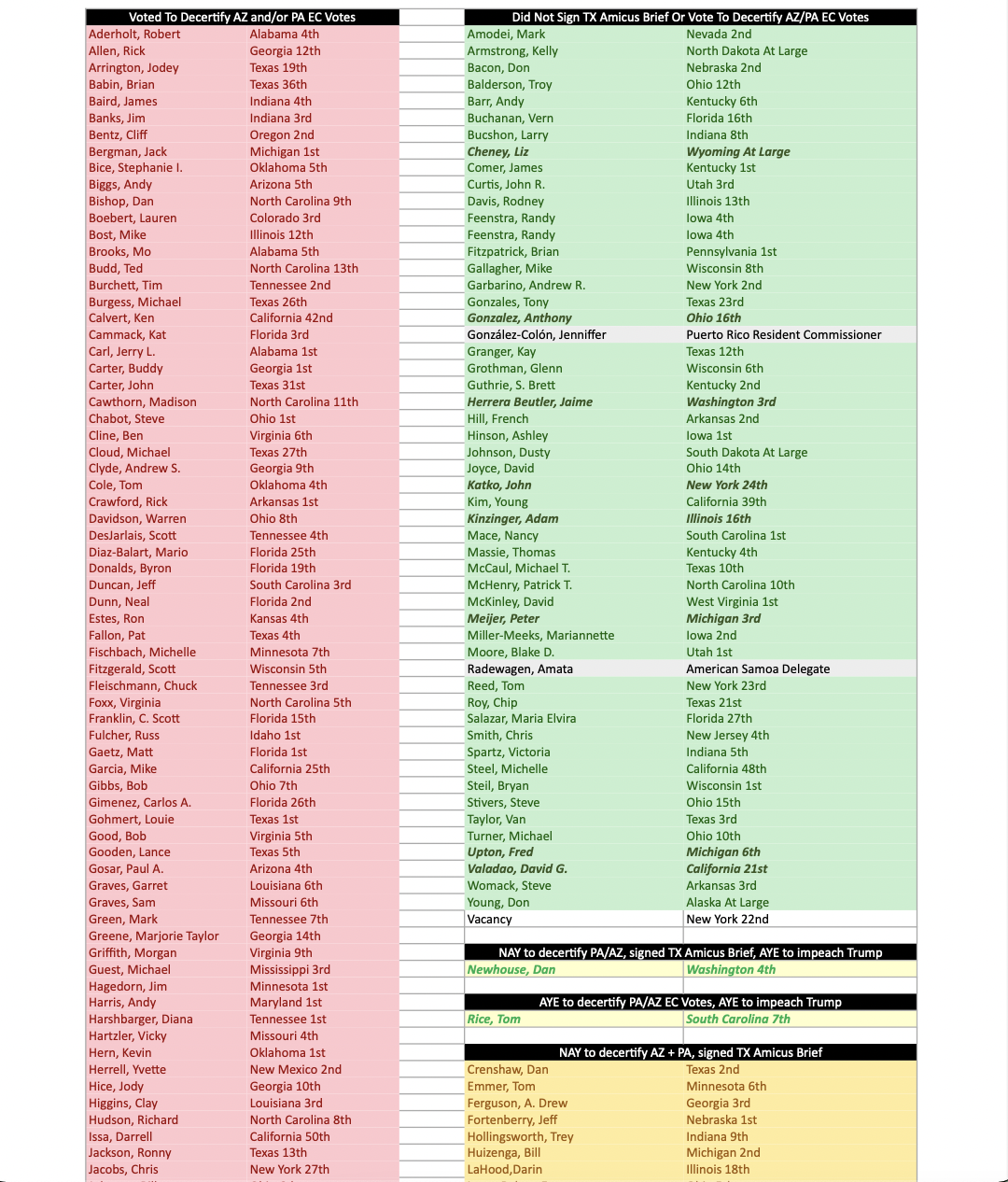Good morning.
The Senate is expected to hold a confirmation vote today on Alejandro Mayorkas’s nomination to be secretary of homeland security. The Senate is also set to vote on Pete Buttigieg’s nomination to be transportation secretary.
Senate GOP Aid Plan
A group of 10 Republican senators met with President Joe Biden last night to pitch their coronavirus relief proposal. The senators are calling for a $618 billion aid package in response to Biden’s nearly $2 trillion plan.
“It was a very good exchange of views,” Maine Sen. Susan Collins told reporters afterward. “I wouldn’t say we came together on a package tonight. No one expected that in a two-hour meeting, but what we agreed to do is to follow up and talk further at the staff level and amongst ourselves and with the president and vice president on how we can continue to work together on this very important issue.”
The GOP framework allocates billions for vaccine distribution, testing expansion, and schools. It would send a round of $1,000 checks to Americans under certain income thresholds. The checks would phase out earlier than under Biden’s plan, capped at an income of $50,000 for singles and $100,000 for joint filers. Families would receive an additional $500 per dependent, including both children and adult dependents.
The Republican plan would also extend the $300 per week federal unemployment benefits, currently set to expire in March, until July. Biden has called to expand the unemployment benefits to $400 per week and extend them through September.
The GOP proposal is miles apart from Biden’s. The president has expressed a willingness to work on a bipartisan basis, but top administration officials say they want to pass something big. Democrats in Congress want to move swiftly on Biden’s plan and intend to kickstart a special budget process this week that requires fewer votes to pass legislation in the Senate than is typically necessary. That process, known as reconciliation, will enable them to pass the aid package under a simple majority in the Senate, without support from Republicans.
You can read more about reconciliation in last Friday’s Uphill. It’s the kind of thing congressional leaders do when they are preparing to move ahead on a partisan basis. Republicans used reconciliation for their failed effort to repeal the Affordable Care Act in the summer of 2017. Later that year, they used it again to advance their tax reform bill.
“While there were areas of agreement, the president also reiterated his view that Congress must respond boldly and urgently, and noted many areas which the Republican senators’ proposal does not address,” said White House Press Secretary Jen Psaki.
She added that Biden said during the discussion “that he will not slow down work on this urgent crisis response, and will not settle for a package that fails to meet the moment.”
Democrats are not going to accept a deal from Republicans roughly a third of the size of Biden’s proposal. They want to pass a sweeping package with many of their priorities, including money for state and local governments and a $15 per hour federal minimum wage.
“I think the Republican offer is sincere, but Biden and Republicans have VERY different ideas for how we address this crisis and voters very deliberately chose Biden’s agenda,” said Sen. Chris Murphy, a Connecticut Democrat. “Some compromise is always warranted, but we have an obligation to see the voters’ intent through.”
For the sake of covering our bases, it’s possible (although not likely, given his posture so far) that Biden could seek an agreement to pass a more modest bill under the regular legislative process, meaning it would need support from 10 Republicans to pass in the Senate. But that scenario would probably be paired with the plan to pass Biden’s larger aid package through the reconciliation process rather than occurring independently of it.
The two paths aren’t necessarily mutually exclusive. Still, the momentum among congressional Democrats so far has been decidedly behind simply getting on with the reconciliation bill instead of waiting to see how talks with Republicans play out. Biden administration officials have also repeatedly said that a two-pronged approach—one bill through regular order, followed by the larger Democratic reconciliation measure—isn’t in the cards.
“We’re not going to do this in a piecemeal way or break apart a big package that’s meant to address the crisis we’re facing,” Psaki said last week.
Even though it’s doubtful, there are a couple of conceivable benefits for Democrats to try to pass something through regular order.
Legislating takes time, and Democratic lawmakers still have to pinpoint exactly which details of Biden’s plan can pass and which won’t have enough support to be included in the final reconciliation bill. With a slim margin for dissent in the House, and with no room for disagreement in the Senate, crafting the package may prove difficult, especially at a fast pace.
Democrats may also benefit from some extra time to think big about their reconciliation plan. Because budget reconciliation measures procedurally require passage of a budget resolution, and Congress passes only one of those per fiscal year (or none at all), Democrats will have only a couple of opportunities to move bills without Republican support through the process before the 2022 midterms. They won’t want to waste any of that bandwidth. Approving a bipartisan plan first could at least ensure that some of the basics, like federal unemployment insurance, are covered for the next couple of months while Democrats hammer out the details of their own measure.
But there are also some clear downsides for Democrats to spend time hammering out a deal with Republicans. To emphasize again what seems to be the trajectory here, those downsides are likely to win out. The odds for any kind of agreement with Republicans are slim at the moment.
Democrats want to quickly follow through on some of their campaign promises, like sending $1,400 checks to most Americans. Talks with the group of Republican senators could slow down progress on a larger aid bill and potentially jeopardize its support among moderate Democrats. Democratic leaders are probably counting on a sense of urgency to smooth the process and win over lawmakers who may otherwise take issue with some of the bill’s provisions. Passing a bipartisan package may ease some members’ existing urgency to act—a sense of urgency that was also undermined to some extent by a report from the nonpartisan Congressional Budget Office on Monday projecting that the U.S. economy will return to its pre-pandemic size by the middle of this year, even in the absence of any additional aid from Congress.
It’s also worth noting that, despite the initial conversation, a deal with GOP senators could always fall through at the last minute. Democratic leaders have instead argued that Republicans can choose to vote for their reconciliation bill, even though it will mostly reflect Democratic priorities. House Speaker Nancy Pelosi and Senate Majority Leader Chuck Schumer reiterated their stance on Monday.
“Congress has a responsibility to quickly deliver immediate comprehensive relief to the American people hurting from COVID-19,” said Schumer and Pelosi. “The cost of inaction is high and growing, and the time for decisive action is now… We are hopeful that Republicans will work in a bipartisan manner to support assistance for their communities, but the American people cannot afford any more delays and the Congress must act to prevent more needless suffering.”
House Democrats Consider Which Republicans to Work With
In the aftermath of the January 6 attack on the Capitol, congressional Democrats are grappling with how to approach their Republican colleagues—especially those who voted to reject Electoral College results from Arizona and Pennsylvania.
“I’ve really been struggling with it,” Rep. Dan Kildee, a Michigan Democrat, told Politico last week. “I have a hard time interacting with those members right now, especially with those I had a closer relationship with. … I’m not going to deny the reality — that I look at them differently now. They’re smaller people to me now.”
Some offices are planning to shun those members, refusing to collaborate on legislation with them like they may have in the past. There is also a very real undercurrent of distrust between Democrats and House Republicans. Some Democrats genuinely fear a number of GOP lawmakers, primarily those who most vocally supported former President Donald Trump’s election fraud lies.
Democratic offices also acknowledge there are some gray areas. There’s the group of members who voted to reject Electoral College results. Then there’s the group that didn’t vote to reject the results. There’s a more puzzling group of Republicans who signed onto an amicus brief for the state of Texas’s effort to get the Supreme Court to overturn the election, but who did not ultimately vote in the House to reject either Arizona or Pennsylvania’s results. Then there are a couple of members who signed the amicus brief but didn’t cast a vote one way or another on the Electoral College objections. And there is, of course, also the small group of 10 Republicans who voted to impeach Trump. (One of those, Rep. Tom Rice, also voted for the Electoral College objections.)
Democrats will have to determine which members they are prepared to work with in the coming months. Some may be more willing to move on, while others may cut ties altogether with the vast majority of Republicans. One Democratic Hill staffer shared a spreadsheet with The Dispatch created for their office to keep track of the different categories. Screenshots are attached below.


Checking In on House Republicans
The House GOP Conference is set to have some significant debates over the party’s future this week.
Members will meet on Wednesday to discuss an effort to oust Rep. Liz Cheney from her leadership position over supporting Trump’s second impeachment. (You can read more about that here.)
Rep. Marjorie Taylor Greene will also meet with GOP Leader Kevin McCarthy this week, as Democrats are calling for her to be removed from her committee posts for comments in which she lent credence to a variety of unhinged conspiracy theories, including suggestions that deadly mass shootings were staged. Greene has also indicated support online for executing top Democrats, as reported by CNN.
In 2019, McCarthy removed former Rep. Steve King from his committees after a similar one-on-one meeting. King had a history of racist remarks, but his issues came to a head when he questioned during an interview with the New York Times why the phrases “white nationalist, white supremacist, Western civilization” were seen as offensive.
It’s not clear whether McCarthy will follow the same standard with Greene. Democrats said Monday that they are prepared to act on their own to remove her from her committees. Last week, she was assigned to the House Budget Committee and the House Labor and Education Committee.
The House Rules panel will consider a resolution Wednesday to boot Greene from the two committees, paving the way for a floor vote on the matter. The resolution would require only a simple majority to be successful.






Please note that we at The Dispatch hold ourselves, our work, and our commenters to a higher standard than other places on the internet. We welcome comments that foster genuine debate or discussion—including comments critical of us or our work—but responses that include ad hominem attacks on fellow Dispatch members or are intended to stoke fear and anger may be moderated.
With your membership, you only have the ability to comment on The Morning Dispatch articles. Consider upgrading to join the conversation everywhere.